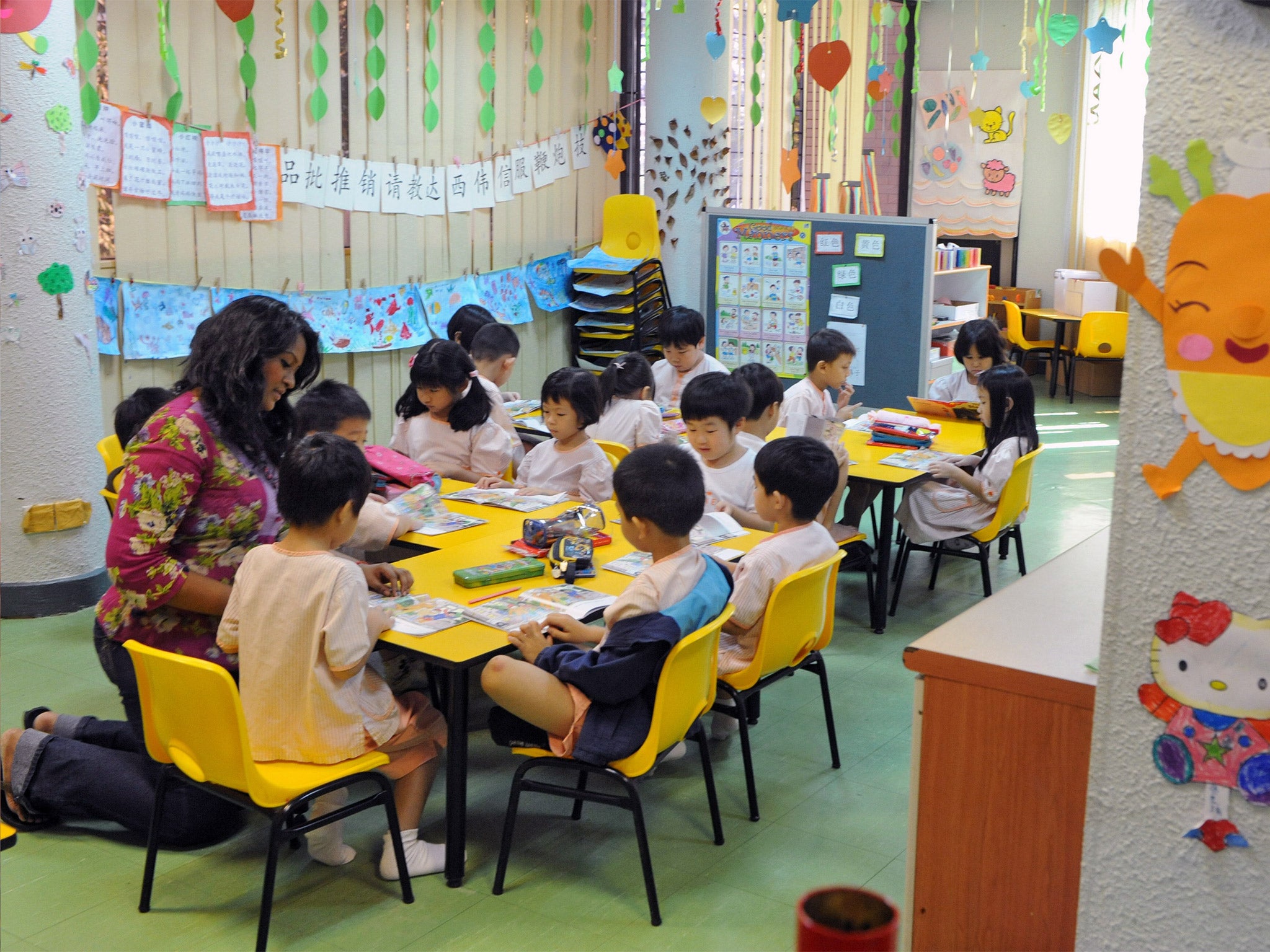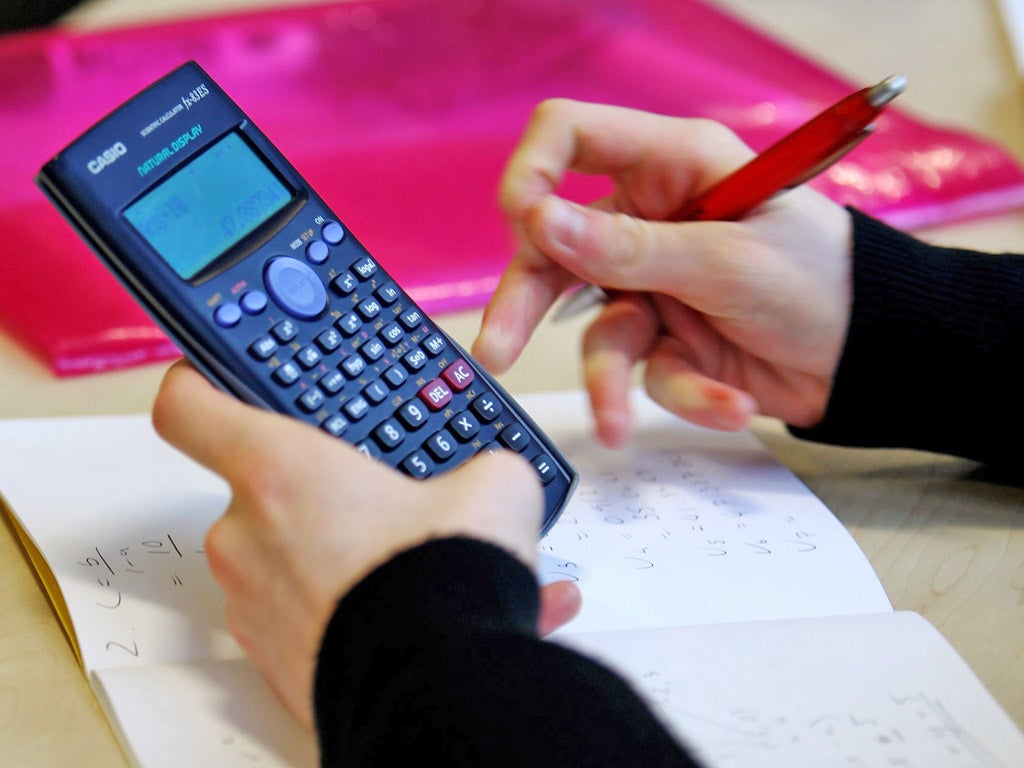Singapore-style teaching helps solve problem of maths failure, says new research
The study shows that children who were taught through the Singaporean 'maths mastery' approach learn faster than their classmates

Your support helps us to tell the story
From reproductive rights to climate change to Big Tech, The Independent is on the ground when the story is developing. Whether it's investigating the financials of Elon Musk's pro-Trump PAC or producing our latest documentary, 'The A Word', which shines a light on the American women fighting for reproductive rights, we know how important it is to parse out the facts from the messaging.
At such a critical moment in US history, we need reporters on the ground. Your donation allows us to keep sending journalists to speak to both sides of the story.
The Independent is trusted by Americans across the entire political spectrum. And unlike many other quality news outlets, we choose not to lock Americans out of our reporting and analysis with paywalls. We believe quality journalism should be available to everyone, paid for by those who can afford it.
Your support makes all the difference.The first conclusive proof that Far Eastern teaching methods can improve UK pupils’ maths performance is revealed in research just published.
A study, by UCL Institute of Education and Cambridge University, shows that children who were taught through the Singaporean “maths mastery” approach learn faster than their classmates - making, on average, an extra month of progress in a calendar year.
Academics also forecast that the increase in their maths skills is likely to lead them to earning more after they leave school - by up to £200 a year.
Researchers looked at the impact of the Singapore method of teaching on five and six-year-olds in 90 primary schools and 11 and 12-year-olds in 50 secondary schools. Schools in the Ark academy chain have adopted the new method of teaching.
The researchers argue their findings “are the first hard evidence that introducing East Asian teaching methods into a western schooling system influences children’s maths performance”.
“Until now there has been little proof that such an approach can be successfully introduced into western education systems,” they add. “Cultural and historical differences have made it difficult to establish why Singaporean children are so far ahead of their English counterparts when it comes to maths,”

The improvement in standards was roughly the same as was achieved by high level curriculum innovations such as the Literacy Hour introduced in Tony Blair’s first Parliament - which had a marked effect in improving reading standards.
The research study adds it suggests that “even a small enhancement of maths skills at age 10 yields long-term economic benefits for individuals and the country”.
Under the Singapore system, teachers generally do not split their pupils into different ability groups.
Instead, they wait for academically weaker pupils to reach a basic standard in each topic before the class moves on to the next concept. The able pupils study the topic in greater depth while waiting for the weaker pupils to master it - thus gaining greater depth of knowledge than their UK counterparts.
The method cuts down on the cost of remedial one-to-one teaching for pupils who struggle to keep up in class.
In addition, the Singapore system concentrates more on developing problem solving skills rather than mental arithmetic.
“These findings have potentially important implications for education policy and practice,” says the study.
It acknowledges that “it is unlikely that widespread introduction of this particular East Asian teaching method would springboard Western countries like England to the top of the ... educational achievement rankings”.
However, it adds: “This does not mean that implementing this teaching method is not a worthwhile investment to make.
“Thus, though we advise policy makers that further evidence is still needed, Maths Mastery nevertheless shows signs of promise and should now be tested over a longer time horizon and in a greater number of schools.”
Dr John Jerrim, the study’s lead author, added: “Maths Mastery shouldn’t be seen as a ‘silver bullet’ ... Yet, given the low cost per pupil, it may nevertheless be a programme worth pursuing.”
A spokeswoman for the Department for Education said that 72 schools had been trialling new textbooks based on the Singapore approach to maths teaching “to see how they drive up standards”.
She added that the new maths curriculum had been developed to reflect the key principles of the Singapore approach.
*The casual effect of East Asian ‘mastery’ teaching methods on English children’s mathematics skills by John Jerrim and Anna Vignoles is the latest working paper to be published by the Department of Quantative Social Science at UCL Institute of Education.
How it works
Maths Mastery concentrates on problem solving skills - using “props” like building blocks to find answers. For instance, in answering the question “There are three consecutive numbers that add up to 42 - what are these numbers?” the pupils are given three wooden bars. They then subtract one for each bar getting 39 and divide this by three to get the answer 13. As the question says the numbers are consecutive, they immediately get the answer 13, 14 and 15.
Case study
Children at an award-winning primary school have begun to develop “a genuine enjoyment” of maths as a result of learning through the Singaporean Maths Mastery programme, according to their teachers.
Daniel Upfield, headteacher of Ark Attwood primary school in Westminster, London,, was surprised during an educational visit to Singapore “how much more adept and at ease pupils were at maths”.
As a result, he was eager to adopt a similar approach in his own school in order to “revolutionise maths teaching”.
The experiment worked - within a year his first year children were achieving well above the national average for maths. The following year the school received a national award for maths teaching from the TES.
Mr Upfield added that as well as the significant increase in academic achievement he had noticed how much enjoyment there was of maths lessons - traditionally a subject that has failed to inspire a number of pupils, “They began to see themselves as mathematicians,” he added.
Dr Helen Drury, programme director of Maths Mastery at the Ark academy chain - which has embraced the project, said: “Every student is capable of being successful if they are given the right opportunities - and those opportunities are what we provide.”
Ghazal Abbasi
Join our commenting forum
Join thought-provoking conversations, follow other Independent readers and see their replies
Comments